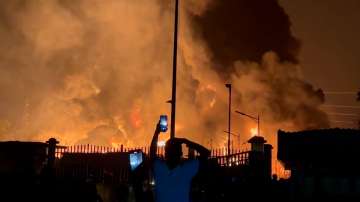In a harrowing incident that has sent shockwaves through Guinea, a massive explosion and subsequent inferno at the Guinean Petroleum Company depot in Conakry's heart claimed at least 13 lives and left 178 individuals injured. The catastrophic event unfolded after midnight on Sunday, causing significant damage to the Kaloum administrative district, which houses the majority of government offices. Among the casualties were foreigners, adding to the grief of a nation already grappling with the aftermath of this tragic disaster. As the extent of the devastation became apparent, neighbouring nations rallied to assist Guinea in managing the crisis.
The explosion, believed to have originated during a ship offloading at the fuel depot, has prompted an urgent investigation by authorities. Despite ongoing efforts to relocate the depot to a remote site as a precautionary measure, the incident raises questions about safety protocols and disaster prevention.
The government's latest update indicates that 89 of the 178 injured individuals have received medical treatment and returned home. Guinea's Civil Protection Service had initially provided a provisional casualty toll, which has now been revised. The toll underscores the severity of the incident and the challenges faced in its aftermath.
With the Guinean Petroleum Company depot being a key supplier of fuel to the nation, there are growing concerns about a potential disruption in the country's fuel supply chain. Guinea heavily relies on imported refined petroleum products, making the situation even more critical. Officials are actively identifying and addressing vital fuel-related needs to prevent further disruptions, emphasizing the urgency of stabilizing supplies from the capital to other regions.
One worker, Ahmed Conde, who witnessed the catastrophic event, shared the profound impact on those stationed at the depot. "I lost several of my friends in this fire. Some, like me, are guards; others are technicians. All offices are destroyed, as well as all equipment," Conde revealed, highlighting the personal toll on those directly affected by the explosion.
Guinee Matin, a news website based in Conakry, quoted the worker's account, shedding light on the chaotic scene at the depot during the incident. The human cost, coupled with the destruction of infrastructure, underscores the long road to recovery that Guinea now faces.
Security Minister Bachir Diallo assured the public through state television that the fire has been contained. Furthermore, international solidarity is evident, with countries such as Senegal and Mali dispatching medical and safety teams to aid in the aftermath of the disaster.
The impact of the explosion extended beyond the immediate vicinity, as thick smoke forced many residents to flee their homes. Authorities responded swiftly by shutting down schools and public places in the capital. Access to the affected district was restricted to essential services, and citizens were urged to stay at home, emphasizing the need for safety precautions amid the ongoing crisis.
Colonel Mamadi Doumbouya, who assumed the role of interim president following a coup in 2021, took to national channels to reassure the public. "The state is taking full care of those injured," Doumbouya affirmed, urging the people of Guinea to unite in solidarity and prayer during these trying times.
As Guinea confronts the aftermath of this tragic event, the international community watches with concern, ready to provide support and assistance in the nation's recovery efforts.
Also read | Earthquake with 6.2 magnitude kills over 111 in China's Gansu, Qinghai provinces, rescue operation on
Latest World News
